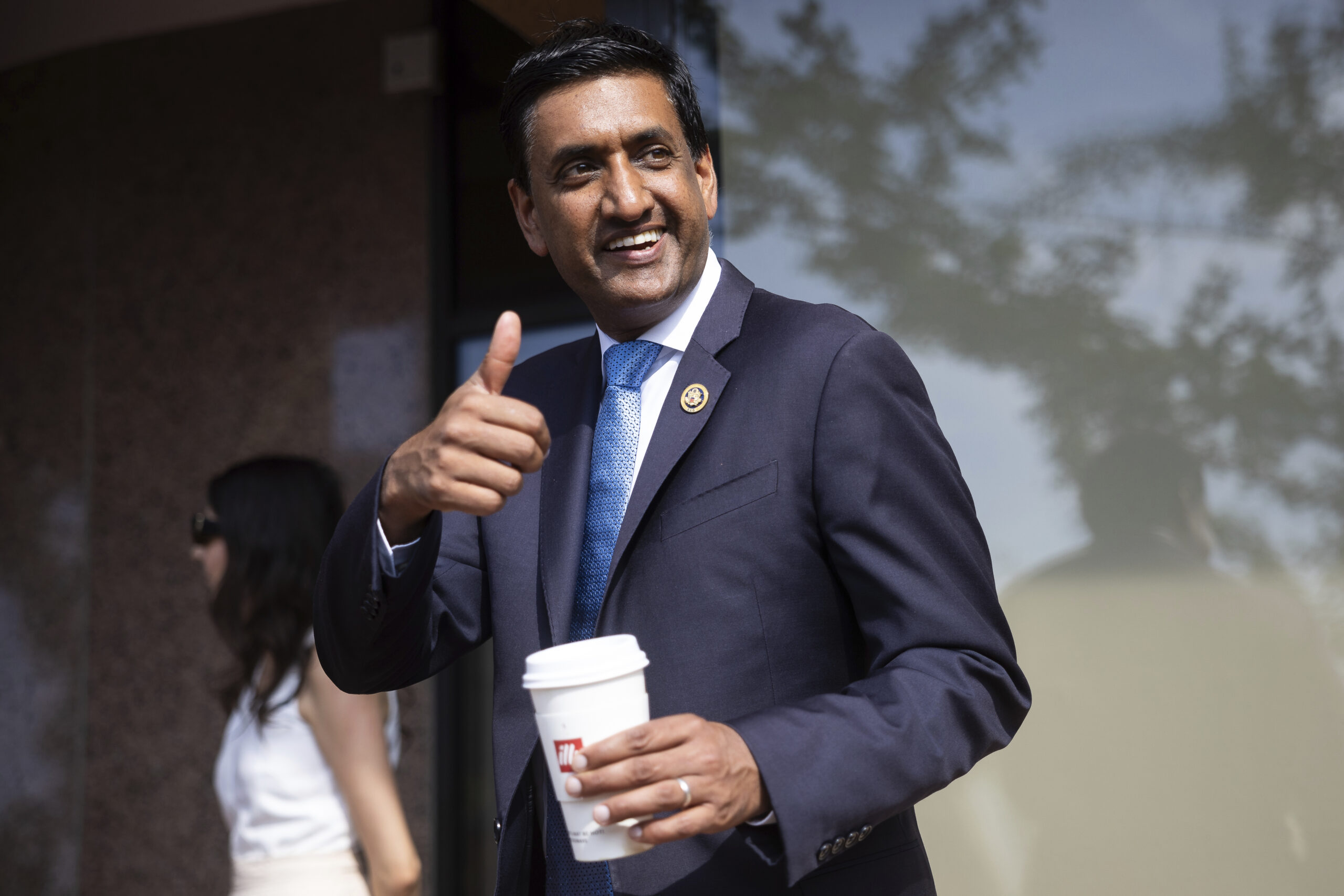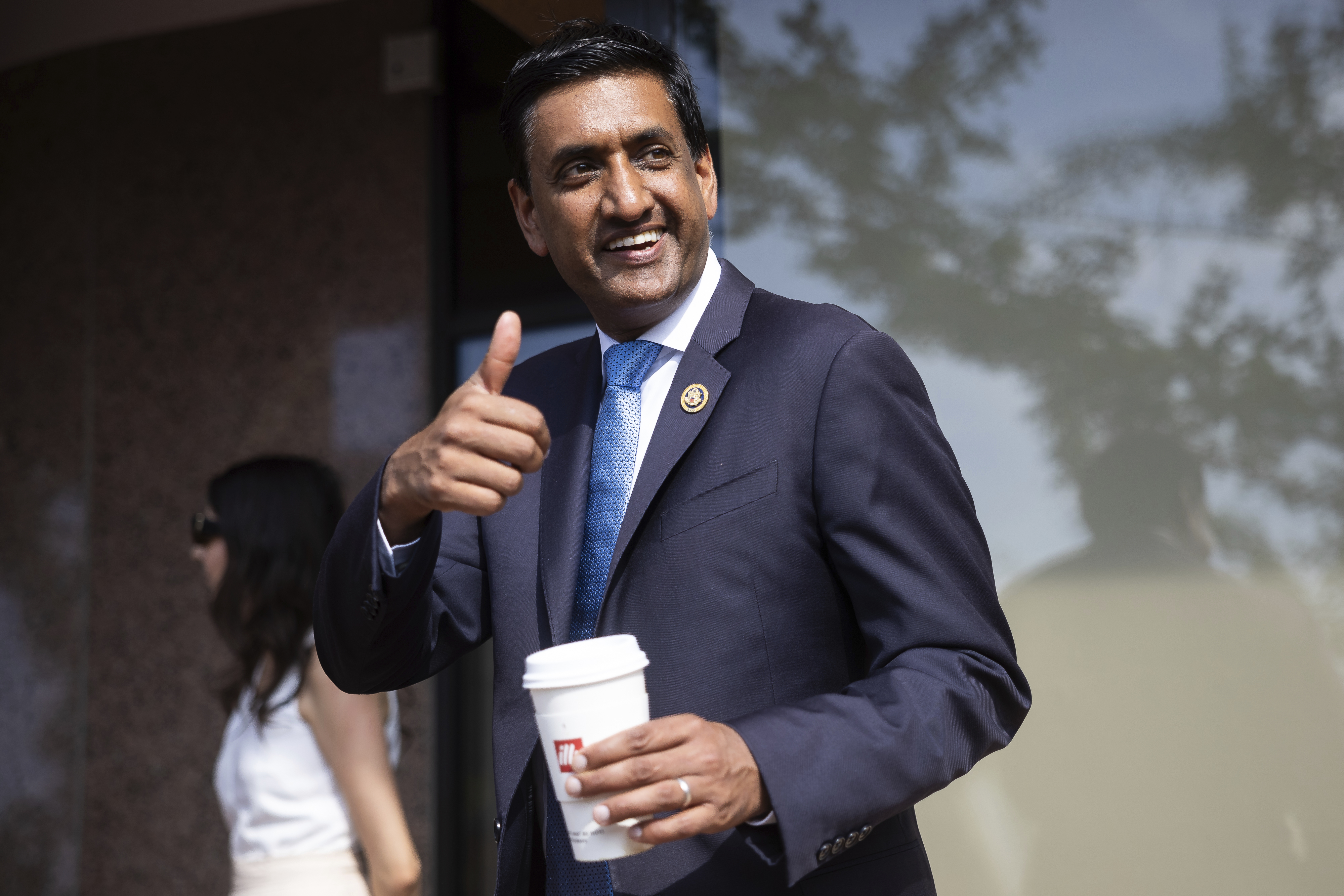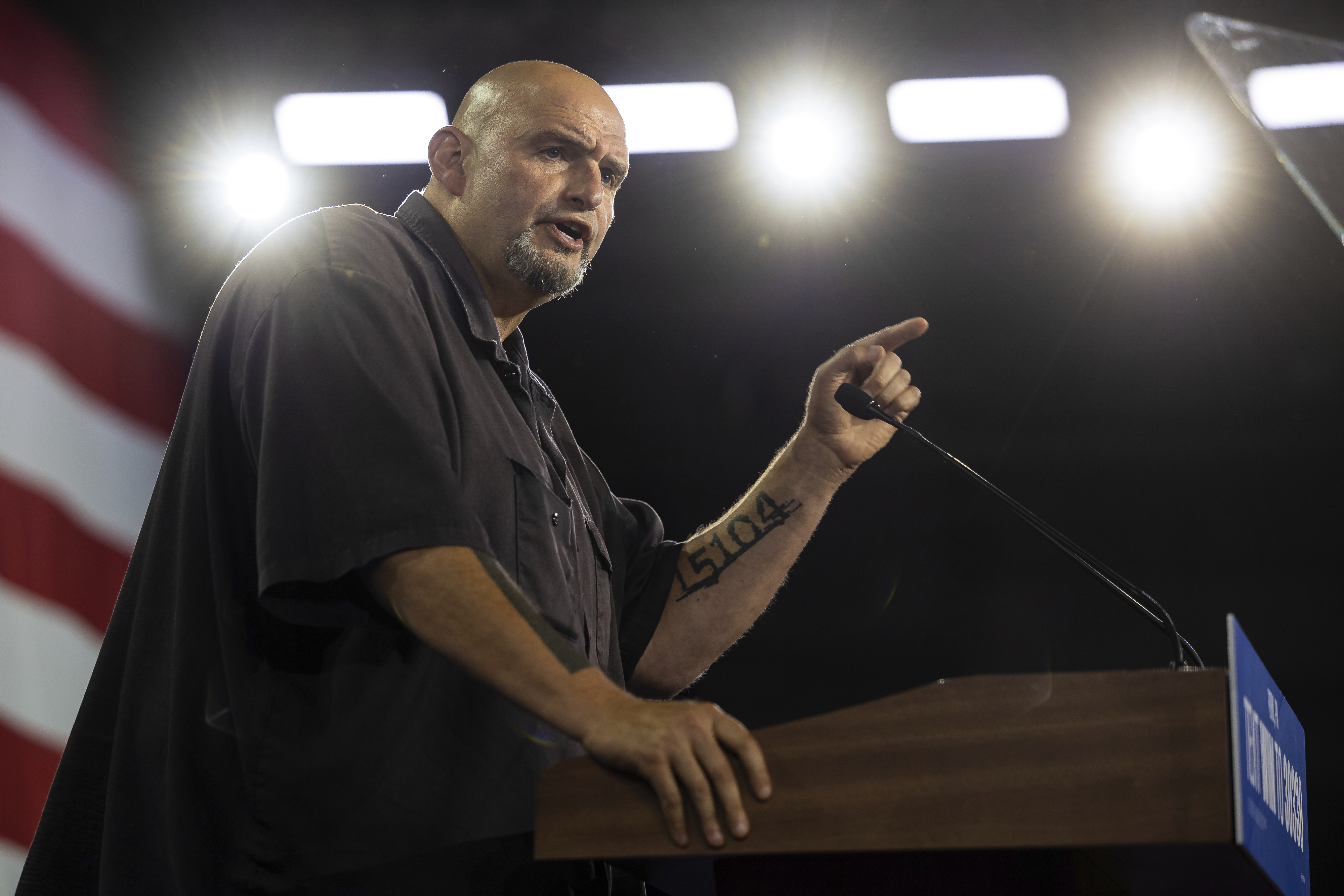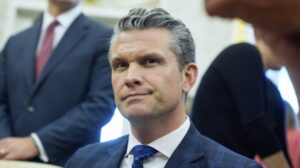Congress
Some Democrats want to thaw their frosty relationship with Elon Musk

Ro Khanna is trading texts with Elon Musk. Josh Shapiro took a call from him. And John Fetterman has compared him to the superhero Tony Stark.
As President-elect Donald Trump prepares to install Musk as the federal government’s cutter-in-chief, some ambitious Democrats are taking a warmer approach to the billionaire businessman than their party leaders have in the past as he has become one the most influential people on the planet.
“He’s had an undeniable impact on the Pennsylvania election, and I think the election overall,” Fetterman, the Democratic Pennsylvania senator, told Blue Light News. “I’ve warned Democrats, if you’re just going to make fun of it or to dismiss it, you do it at our peril. And I think that’s very clear what happened.”
Musk is the world’s richest man, and his companies are helping determine the future of space exploration, electric vehicles, AI and social media. Democrats who are making friendly overtures to him said that they want to shape the thinking of someone who will have an outsize microphone regardless of what they do. They are also eager to encourage him to develop his businesses in their backyards.
Some of them are also eyeing presidential runs in 2028, and may want to avoid getting on his bad side for political reasons. Musk spent $280 million this year supporting Trump and other Republicans.
The relationship between Democrats and Musk has been icy for the past few years. President Joe Biden said Musk’s ties to other countries were “worthy of being looked at” and attacked him as a one-time “illegal worker.” Musk, in turn, called Biden and Vice President Kamala Harris each a “puppet.” Liberals also laughed off Musk’s purchase of X and his efforts to turn out the vote for Trump — with vice presidential nominee and Minnesota Gov. Tim Walz mocking him for “skipping like a dipshit” on stage at a rally.
But increasingly, some Democrats are arguing that was the wrong approach and think Musk played an outsize role in helping elect Trump — the latest sign that the left is confronting the president-elect differently this time around. It’s an open question whether other Democrats will follow suit, and either benefit or suffer consequences.
Some Democrats remain deeply skeptical of Musk, who is one of several billionaires and tech leaders Trump has tapped to staff his administration. They see Musk as an oligarch, and are concerned about his plans to slash the federal government with entrepreneur Vivek Ramaswamy as incoming co-leaders of Trump’s Department of Government Efficiency.
“I reserve the right to be surprised, but this looks to me like a coming kleptocracy, in which all these billionaires are running the government in order to rig the rules,” said Sen. Chris Murphy (D-Conn.). “So I’m pretty fucking skeptical that this is a legitimate effort.”

Khanna, a House Democrat who represents Silicon Valley and a potential future presidential candidate, has known Musk for more than 10 years. In an interview, he called Musk an “an extraordinary entrepreneur” and said that he fits the mold of Franklin D. Roosevelt’s “dollar-a-year men,” the corporate executives who were paid a symbolic salary of $1 annually to help the federal government mobilize for WWII.
Khanna said he has “exchanged texts” with Musk since Trump tapped him to head DOGE. He declined to “go into private exchanges” but said they have discussed “the places where we can collaborate.”
“We have a candid conversation. He also knows where I disagree with him,” he said. “We need to engage these technologists and builders to be part of our coalition, but without compromising our values.”
In a post on X this month, Musk said that Khanna is a “sensible moderate” after the lawmaker said on TV that he disagreed with California Gov. Gavin Newsom’s proposed electric vehicle subsidy, which would likely exclude his company Tesla. Musk did not respond to a request for comment.
Shapiro, the Pennsylvania governor who is widely seen as a top 2028 presidential candidate, took a short call from Musk in October when the entrepreneur was sitting in businessman Thomas Tull’s box at a Steelers game. Tull and Musk were reportedly talking about investments in Pennsylvania when Tull decided to call Shapiro and put him on the phone with Musk.
Shapiro told NBC that their conversation “was 100% on economic development.”
“I’m always fighting hard to make sure that folks invest in Pennsylvania,” he said. “We did not discuss politics. We obviously have completely different views on politics, different choices and candidates.”
A Shapiro spokesperson declined to provide more information on the call.
Fetterman, who is also rumored to be eyeing a bid for the White House, said that he has not talked with Musk. But he said he is open to working with him to “cut waste” and argued that “it’s undeniable that he is an innovator, and our American economy is better because of him.” He cautioned Democrats to not dismiss him.

“If our government is issuing checks for billions for his companies to rescue our astronauts, or he’s involved in things like AI and really important things, it’s like he is going to be part of this conversation,” said Fetterman. “And that’s a fact. And you want it to be as productive as possible.”
Even some progressive lawmakers have signaled that they are open to working with Musk, encouraging him to look at the Pentagon for cuts. But their efforts are likely different from some of their moderate colleagues and instead aimed at garnering attention for their longtime goals — slashing the defense budget is one of them — while also holding Trump accountable for his populist campaign promises.
Sen. Elizabeth Warren (D-Mass.) told Blue Light News that “If Elon Musk wants to change government contracting to cut billions of dollars of waste out of the Pentagon budget, count me in.” Sen. Raphael Warnock (D-Ga.) said that “I’m all in for cutting waste, making our government efficient and delivering for the people of Georgia” and “I’ll work with whomever I have to work with, if I can, to get that done.”
Sen. Bernie Sanders (I-Vt.) likewise posted on X, “Elon Musk is right. The Pentagon, with a budget of $886 billion, just failed its 7th audit in a row. It’s lost track of billions.”
In some ways, Democrats are returning to form with Musk. Before becoming Trump’s top ally, Musk previously called himself a Democrat and voted for Biden in 2020. As president, Barack Obama met with Musk in the Oval Office and toured SpaceX with him.
By contrast, Musk has complained that Biden’s administration ignored Tesla, including by excluding it from the White House’s electric vehicle event. Biden and Musk have also taken opposing views on labor organizing, with the president supporting the United Auto Workers and the Tesla CEO criticizing the union’s efforts at his company. Musk made a rare visit to Biden’s White House last year, but the meeting was not with the president himself.
During her presidential campaign, Harris likewise held Musk at arm’s length, refusing a proposed interview with him. While touring Pennsylvania in support of Trump, Musk said after the assassination attempts against the former president that “nobody even bothers to try to kill Kamala,” adding, “It’s pointless. Why? They’ll just get another puppet.”
Rep. Pramila Jayapal, the outgoing chair of the Congressional Progressive Caucus, said that she is taking a wait-and-see approach to Musk and DOGE.
“I never say never to working with somebody, but I got to see what it is, because there’s a lot of controversies and hypocrisies that are out there,” said Jayapal. “I’m gonna put together my own list of where I think we should be cutting. And I have a feeling it’s not gonna be the same as their list. But I’m gonna try.”
Congress
George Santos, who conned his way to Congress before getting booted, sentenced to more than 7 years in prison
CENTRAL ISLIP, New York — A federal judge on Friday sentenced disgraced former Rep. George Santos to more than seven years in prison for wire fraud and aggravated identity theft in a case that resulted in his expulsion from Congress and capped a colorful flameout for the first-term Republican.
The 87-month sentence for Santos, who wept as it was announced, comes after a memorable one-year stint in Congress in which he was exposed, in prosecutors’ words, as a “pathological liar and fraudster.”
In imposing the lengthy sentence, U.S. District Judge Joanna Seybert decried his “flagrant thievery,” describing him as “an arrogant fraudster talking out of both sides of his mouth.”
His voice shaking, Santos told the court, “I betrayed the confidence entrusted to me by constituents, donors, colleagues and this court.”
He must report to prison by July 25. Seybert also ordered him to pay more than $373K in restitution, due immediately, and to serve two years supervised release.
Santos’ political saga gripped Washington and New York, where he flipped a Long Island House seat in a little-watched 2022 race that led to his prominent rise and ultimate downfall. After prosecutors charged him in May 2023, he refused to resign, buoyed by the support of many House Republicans. That support eventually dwindled, however, and Santos became the first member since the Civil War to be booted from the House without a conviction.
In August 2024, he pleaded guilty to two felony charges and acknowledged he used his campaign fundraising apparatus for personal gain. He admitted to submitting false reports to the FEC during his congressional run and to stealing the personal identity and financial information of elderly and cognitively impaired campaign donors. He fraudulently charged their credit cards, making unauthorized contributions to his campaign and others.
He also admitted to persuading donors to contribute money to a company that he claimed was a social welfare organization or super PAC, when in fact he used their contributions to put himself up at the Venetian Hotel in Las Vegas, shop at Hermès, Louis Vuitton and Brooks Brothers, pay off his credit cards and gift himself thousands of dollars in cash.
“His campaign for Congress didn’t turn him into a fraudster,” prosecutor Ryan Harris said at the sentencing. “It simply revealed him for what he already was.”
The criminal investigation and a separate congressional inquiry, coupled with significant media coverage, revealed that Santos had promoted scores of lies about his educational and professional background, as well as numerous other falsehoods, including that his mother died in the Sept. 11, 2001, terrorist attacks.
The House of Representatives voted to expel Santos in 2023 after the ethics committee released an explosive report that found “significant evidence” of Santos’ criminal wrongdoing. Democrats last year won back his Long Island seat in a special election.
“From his creation of a wholly fictitious biography to his callous theft of money from elderly and impaired donors, Santos’s unrestrained greed and voracious appetite for fame enabled him to exploit the very system by which we select our representatives,” prosecutors wrote in their sentencing memo.
They had recommended he receive an 87-month sentence, in large part because, they argued, he wasn’t remorseful. In fact, after prosecutors submitted their sentencing memo, they provided an additional filing to the court highlighting Santos’ social media posts to demonstrate that he remains “unrepentant.”
In one post, he referred to himself as a “scapegoat,” and in another, he denied having used campaign contributions to shop at Hermès. “No matter how hard the DOJ comes for me,” he wrote in another post, “they are mad because they will NEVER break my spirit.”
In a letter to the court, Santos argued that he is “profoundly sorry for the criminal conduct to which I pled guilty,” but that he has the right to “protest” the Justice Department’s request for the lengthy sentence. Santos himself suggested he serve two years, the legal minimum for one of the counts to which he pleaded guilty.
Congress
Lawmakers to attend Pope Francis’ funeral
A bipartisan Senate delegation will attend the funeral of Pope Francis in Rome on Saturday.
“It is a tremendous honor to be selected to lead this bipartisan delegation of United States Senators to Rome to attend the funeral of Pope Francis and pay our respects to his life and legacy,” Republican Sen. Susan Collins, who is leading the trip, said in a statement Friday.
Democratic Sens. Dick Durbin of Illinois and Ed Markey of Massachusetts will join Republican Sens. Mike Rounds of South Dakota and Eric Schmitt of Missouri as part of the Collins-led Senate contingent.
The group marks the first official congressional delegation to announce plans to attend the pope’s funeral, though House members have also discussed traveling to Rome for the event. Lawmakers heard from Francis in a joint meeting on Capitol Hill in 2015 — the first time a pope has ever delivered such an address.
Francis had struggled with health issues in recent years and died at 88 on Easter Monday after a stroke. Tens of thousands of mourners have also lined up to view him lying in state inside St. Peter’s Basilica ahead of the funeral this weekend.
In addition to the showing from Capitol Hill, President Donald Trump is one of several heads of state expected to attend the funeral. It will mark Trump’s foreign trip since the start of his second administration.
Congress
Dick Durbin is retiring from the Senate
CHICAGO — Illinois Sen. Dick Durbin, the No. 2 Senate Democrat and his party’s top leader on the Judiciary Committee, announced Wednesday that he won’t seek a sixth term in 2026.
“I know in my heart it’s time to pass the torch,” the veteran senator said in a social media post Wednesday.
Durbin, who is 80, confirmed what many Democrats have expected for months — that the veteran senator would step aside after three decades in office.
His departure comes at a perilous moment for the judicial system as the Trump administration repeatedly tests the limits of executive power and challenges the authority of the courts.
Illinois Democrats have already been lining up in anticipation of his announcement, hoping for a chance at the Senate seat. Reps. Robin Kelly, Raja Krishnamoorthi and Lauren Underwood, as well as Illinois Lt. Gov. Juliana Stratton and state Sen. Robert Peters, have all signaled an interest in the seat.
Durbin’s exit also opens up a top slot in the Senate Democratic leadership for the first time in a decade. Many in the party have eyed Durbin’s retirement as a prime opportunity to elevate a younger voice into the senior ranks.
Durbin made headlines last month for being one of 10 Democrats who voted with Republicans to advance a GOP-crafted stopgap spending bill. Durbin drew criticism from progressive groups, who used the words “profoundly disappointed” and “cowardice” in calling out his vote.
He told reporters he believed the vote was the “responsible thing to do” to avoid a government shutdown.
The criticism was a blip in Durbin’s career advocating on high-profile national issues and for the state of Illinois.
In 2001, Durbin introduced the DREAM Act, which gives undocumented immigrants who grew up in the U.S. a chance to become citizens. A decade later, he successfully urged then-President Barack Obama, another Illinois native, to stop the deportation of Dreamers. That move led to the Deferred Action for Childhood Arrivals program that exists today.
Durbin has also championed efforts to reform sentencing laws, curb credit card fees and ban smoking on commercial airline flights.
In 2005, Durbin met Tammy Duckworth, then an Army National Guard Blackhawk helicopter pilot who 12 weeks earlier had lost both her legs after being shot down in Iraq. He would become a mentor and advocate for Duckworth as she pursued a political career as assistant secretary of Veterans Affairs and then as a member of the House and Senate.
And in 2022, Durbin led the confirmation of Supreme Court Justice Ketanji Brown Jackson, the first Black woman to sit on the high court.
“In the years to come, one of my grandchildren may ask where I was on the historic day of April 7, 2022, when America broke down what seemed like an impossible racial barrier and voted to send the first Black woman to serve on our highest court,” Durbin said on the Senate floor before her confirmation vote “I will be proud to say I was on the Senate floor, standing at my desk, and casting my vote for Justice Ketanji Brown Jackson.”
Illinois residents know Durbin for his work advocating for infrastructure funding, securing federal dollars to modernize Illinois airports and helping establish the Abraham Lincoln Presidential Library and Museum, which earlier this week honored him for his career.
Durbin was first elected to the Senate in 1996, succeeding Democratic Sen. Paul Simon. In the primary that year, Durbin defeated Pat Quinn, who would later become governor of Illinois. In the general election that year, Durbin defeated Al Salvi, the husband of Kathy Salvi, who now chairs the Illinois Republican Party.
Before his career in the Senate, Durbin practiced law in Springfield, Illinois, and served as legal counsel to Simon and then the Illinois State Senate Judiciary Committee. He then won a U.S. House seat in 1982, serving seven terms before running for Senate.
CORRECTION: An earlier headline on this story referred incorrectly to the length of Durbin’s Senate service. He is in his fifth term.
-

 The Josh Fourrier Show6 months ago
The Josh Fourrier Show6 months agoDOOMSDAY: Trump won, now what?
-
Uncategorized5 months ago
Bob Good to step down as Freedom Caucus chair this week
-

 Politics6 months ago
Politics6 months agoHow Republicans could foil Harris’ Supreme Court plans if she’s elected
-

 Politics5 months ago
Politics5 months agoWhat 7 political experts will be watching at Tuesday’s debate
-
Economy6 months ago
Fed moves to protect weakening job market with bold rate cut
-
Uncategorized5 months ago
Johnson plans to bring House GOP short-term spending measure to House floor Wednesday
-

 Politics5 months ago
Politics5 months agoRFK Jr.’s bid to take himself off swing state ballots may scramble mail-in voting
-
Economy6 months ago
It’s still the economy: What TV ads tell us about each campaign’s closing message








